Governance of Tron Ecosystem - Crypto Academy / S4W7 - Homework post for [yohan2on]
Hello friends, it's nice participating in this week's lessons for Steemit Crypto Academy S4W7. For my first submission, I will be making my entry for prof @yohan2on on "The Governance of the Tron Ecosystem".
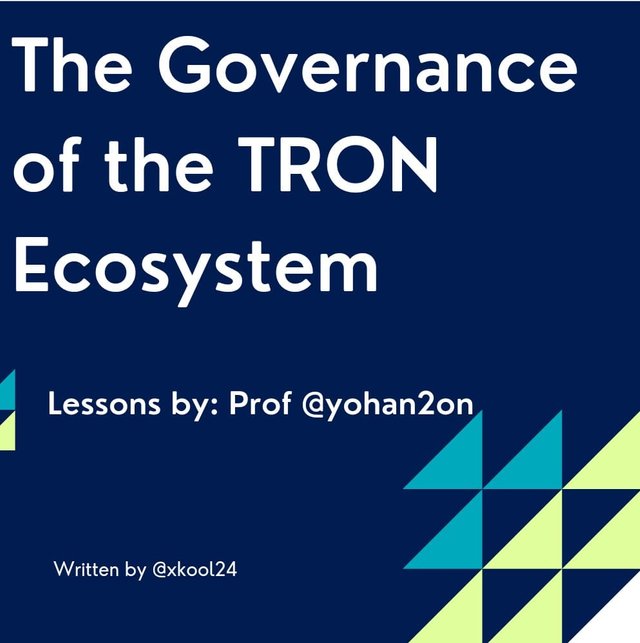
(Designed in Canva)

1 * Who are Super Representatives, SR partners, and SR candidates? (The Governance of the TRON Ecosystem)

Who are Super Representatives (SR)
The Tron Ecosystem has been at the forefront in delivering Blockchain technological advancement to its users with so many on-Chain features built on its protocol via the smart contract system. One of the latest is the inclusion of Wrapped tokens into its Blockchain which was a synergy between the Tron Team and BitGo form which is the leading firm in wrapped token minting.
The Tron Ecosystem has an On-chain Governance that takes into cognizance the role of the Super Representative (SR) in its system with capabilities to initiate voting for proposals geared towards the overall development of the Tron Ecosystem. This shared opinion of interest from the Super Representative is known through the voting which is an important feature of a decentralized system.
The Tron Ecosystem has in its system 27 Super Representatives who are actively selected in each round. And each round is observed to have a time duration of 6hours. This requires that a Super Representative retains this slot of being amongst the top 27 Representative through the required votes otherwise may not continue in that role after that round.
Most importantly, the Super Representative is simply the book-keepers of the Tron Ecosystem who are in charge of Verification and packing of Transaction done in the Tron Ecosystem. This entails that they are responsible for the regular and timely maintenance of the Tron Network. Just for this very important role, they play in the system, their background data are usually made known in the Tron Ecosystem for interested voters to know who they vote as their Super Representative. (A user can only vote for one Super Representative of choice). In all of this voting of Super Representative, this is followed by technical support to Network by the Tron Foundation and Community.
The On-chain incentive mechanism which also inculcates the activities of the Super Representative sees to the effect that packed transactions as well producing blocks in the ecosystem come with some form of rewards (block production incentives). Also, a certain percentage of rewards received from the system is extended to the voters who staked in the course of voting Super Representatives.
To be eligible to vote a Super Representative, the user must stake its TRX tokens. For every unit of Tron power, it goes with a corresponding 1 TRX token. This also comes with a stake reward at the end of the day.
Lastly, in the Tron Blockchain, blocks are formed every 3seconds with 20 new blocks expected in a given minute. Therefore with the reward scheme, the Super Representative is rewarded 16TRX per block with an anticipated 320 TRX tokens expected every minute. They are also expected to receive rewards from the 115,200TRX token shared to TOP 127 Representatives (6 hours duration) which are hence distributed to all candidates relatives to their voting ratio
The Super Representative Partners (SRP)

Just like the Super Representative, the Super Representative Partner has a role to play in the Tron Ecosystem. We see this category of representatives as those who couldn't make it to the top 27 Representatives but are amongst the top 127 in the ranking. They specifically captured between ranges from 28 to 127.
These sets are limited in their role as they cannot take part in the block production as well packing of Transaction in the network. These are exclusive roles of the Super Representative in the ecosystem. But it will interest us to know that the Super Representative Partner still earns rewards for newly created/Produced blocks in the network. But rewards are awarded to these 100 Super partners relative to their voting capacity in the system.
They are observed to also participate in voting activities in the ecosystem which are for purposes to improve Blockchain governance. There they can also raise proposals in line with what we have for the Super Representative. Rewards are earned from staking for voting and ordinary voters are also rewarded relative to incentives accrued to SRP.
Super Representative Candidates (SRC)

The Super Representative candidates are the required Top 127 individuals who are participants in the development and Blockchain governance of Tron Ecosystem. It comprises the Top 27 Super Representatives and additional 100 more candidates known as Super Representative Partners.
Just as we've differentiated the role of these two candidates, their roles are likely going to change every round of 6 hours duration when we expect voting activities to take place. Both categories of candidates have something in common which is the reward system that is available for them from their voting ratios as well block production and transaction packing.
They are all saddled with the responsibility of managing the Tron Network in their different capacities.

2 * What’s the difference between DPOS and POS consensus mechanisms?

Overview
These are both consensus mechanism ball created and developed as an advancement protocol to correct the limitation observed before the already existing consensus algorithms before its emergence. The Proof Stake was developed to ameliorate the high energy consumption seen in the Proof of Work (PoS) for efficiency while validating transactions.
It goes as far as adopting a system that incentivizes participants in confirmation of network information as well as collateralizes its system to ensure the safety of the process. The Delegated Proof of Stake (DPoS) was also advancement on the Proof of Stake which was observed from some observed limitations inherent on the consensus mechanism.
Highlights for Proof of Stake (PoS) Consensus Algorithm

The Proof of Stake as a consensus algorithm leverages the number of stakes available or locked up in the network as collateral to verify and validate transactions in the system.
The Proof of Stake relatively uses low energy consumption in its pitscol while validating blocks in the system.
Validation done in the Proof of Stake Mechanism is randomly selected. Validators in the system are randomly selected to validate blocks.
System Validators' selection observed in the PoS are relative to Size of Staked Token as well the Age of Staked Token unspent for a longer period.
Platforms using the PoS Consensus Algorithms are relatively protected as validators are at risk of losing more of their staked tokens if found wanting to send malware attacks into the system. (The cost of sending malicious items in the system is higher than validating a block).
One of the observed kickbacks is that the PoS is skewed towards favoring the wealthy who have wall chests to acquire more staked tokens. This is because the system allocates more validation time to users with more stakes in the protocol.
Highlights for Delegated Proof of Stake (DPoS)

Just as earlier mentioned, the DPoS is an advancement on the PoS Consensus Algorithm. The just celebrated PoS also have limitations, this is to show that for every Consensus mechanism created to resolve an existing limitation, it creates another one for itself. No system is perfect!!!
In this consensus mechanism concept, validators are elected through votes to delegate who would validate the next block in the ecosystem.
Voting of a delegate can be done through a staking pool with the delegate linked to it. This makes it more certain most times that the validators of a block now may likely not be the validator of the next block.
Validators which may as well be called Witnesses receive their rewards from block transaction fees Voters who in return appropriate the percentage ratio due to those voters who participated in affirming its delegation to validate a given block.
This concept does not empower any category of persons (unlike seen in PoS where the wealthy are favored) rather it allows staker to earn their reputation in a more democratic way to be elected delegates.
In the Delegated Proof of Stake, there are relatively limited numbers of witnesses which enhance the network system to reach a consensus where validation block can be more scalable.

Write a Step by Step tutorial showcasing how to stake/freeze TRX and vote for SRs.

Steps to Freeze and Vote for SR
I will show us a more simplified method to freeze and Vote for our SRs of choice. I will be demonstrating this using my Tronlink wallet.
- Launch your Tronlink wallet on your device
- From your landing page, click on the Freeze options on the screen
- from the resource page, enter the amount of TRX to be Frozen and click on the Freeze button.
(I will be entering 10TRX which I expect to give me 10 TP) - Confirm your Transaction
- Then enter your Password to conclude this transaction
- We can see confirmation of frozen TRX assets from the screen
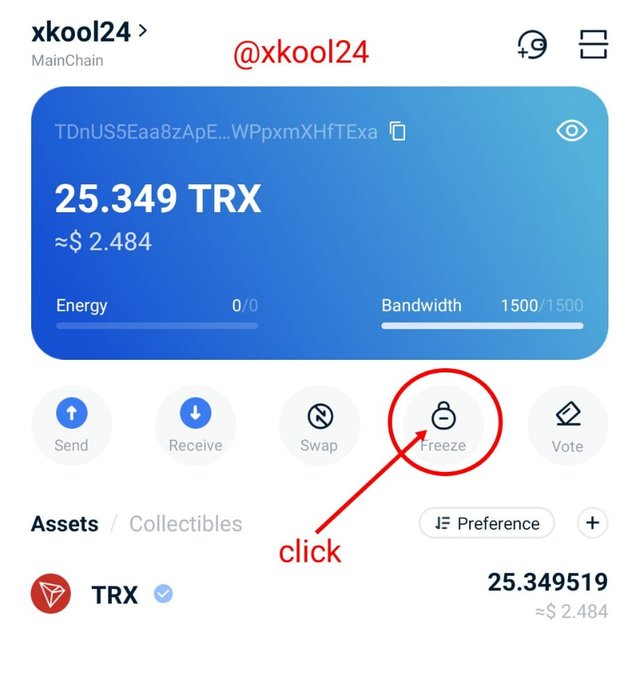
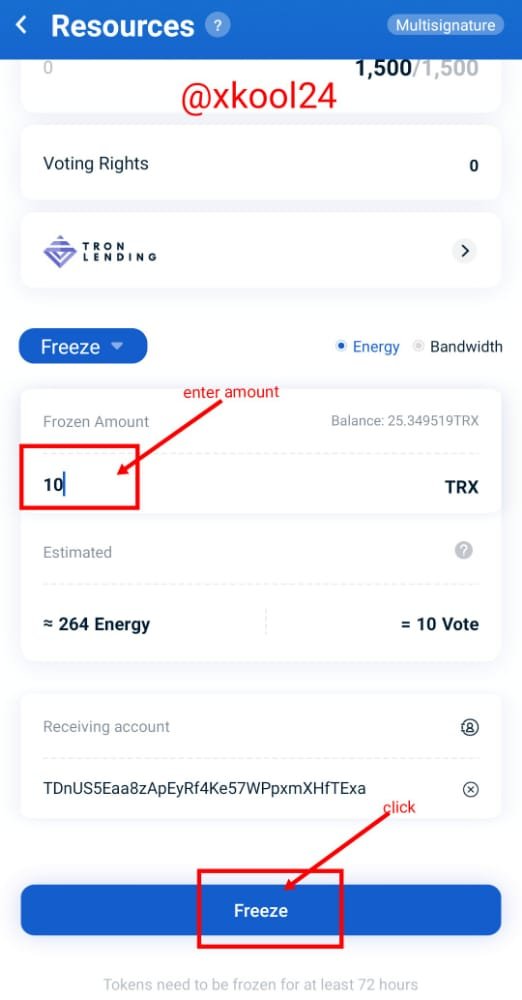

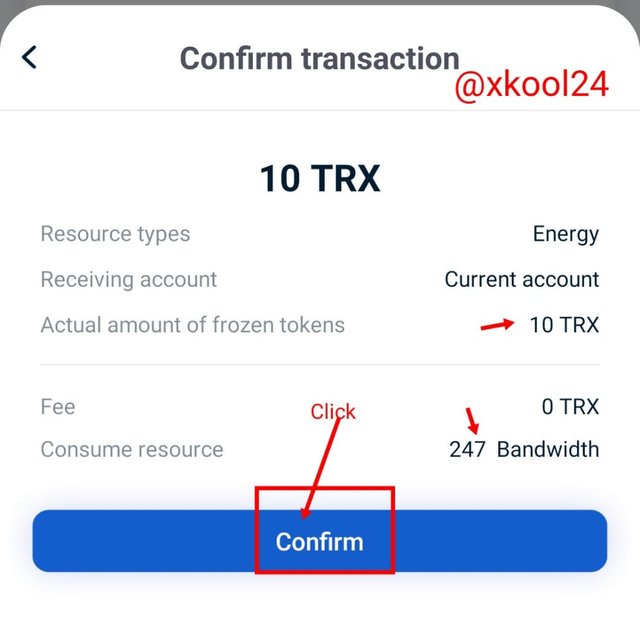
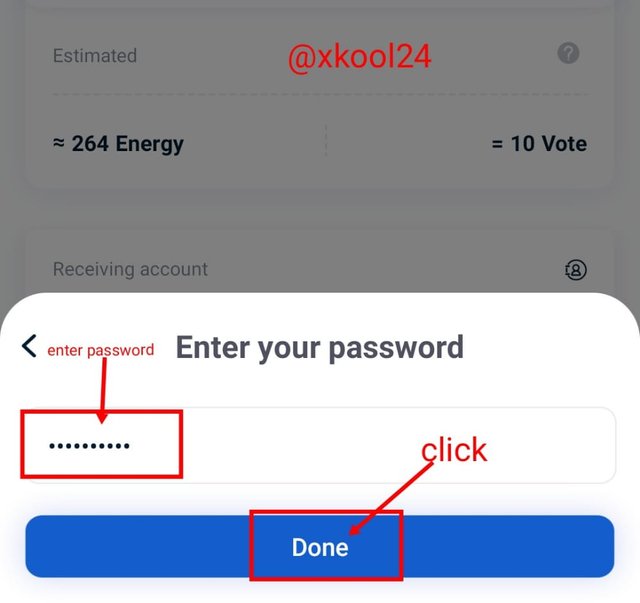

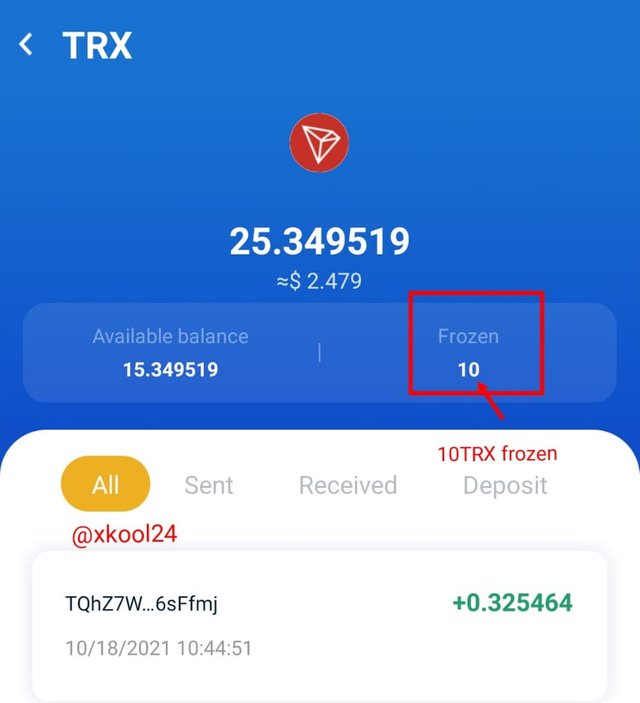

Voting Process
- From the initial landing page, click on the Voting option
- Choose your preferred SRs from the list of SR available. I will be voting for BinanceStaking with a 5.01% estimated yield.
- then click on the Vote Button to proceed
- Enter the number of votes for SR (10 votes) and click on the confirm button.
- Enter Your password and the process is complete
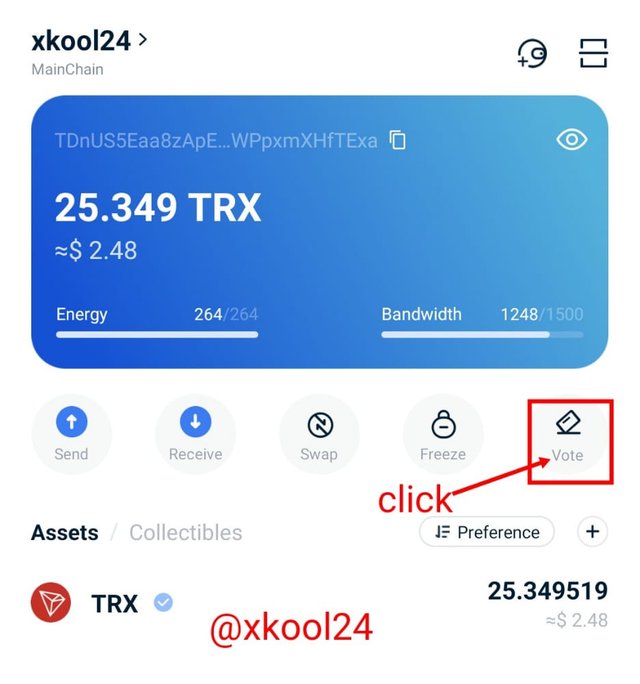
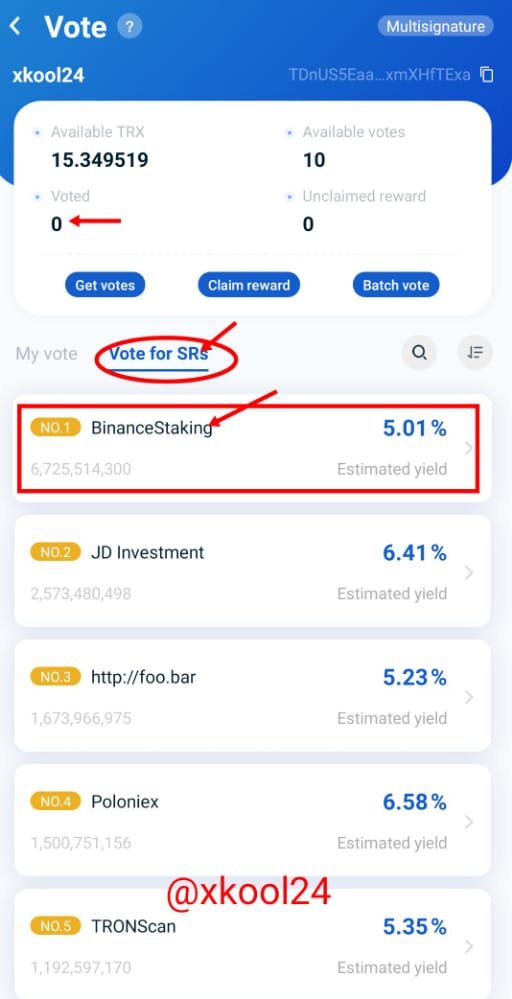

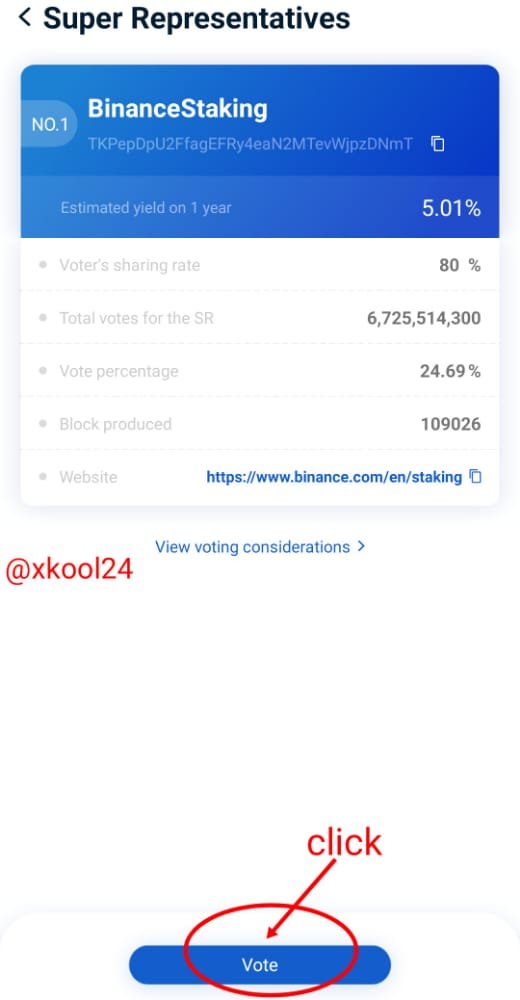
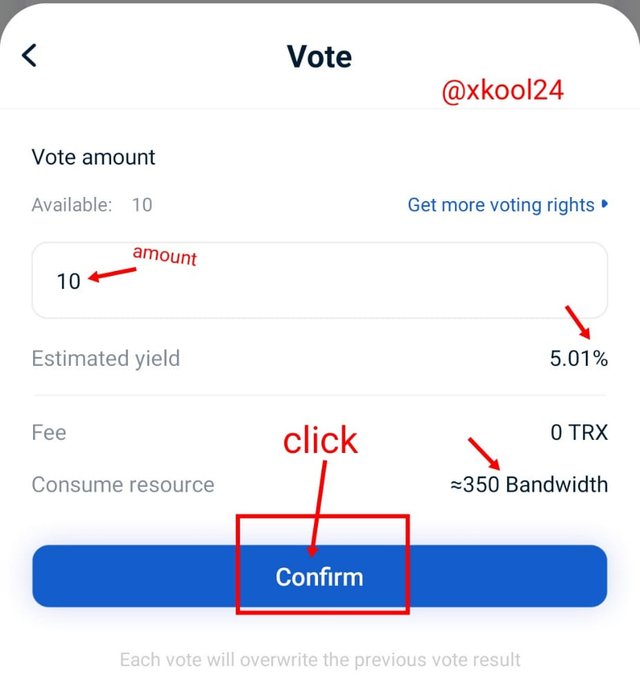

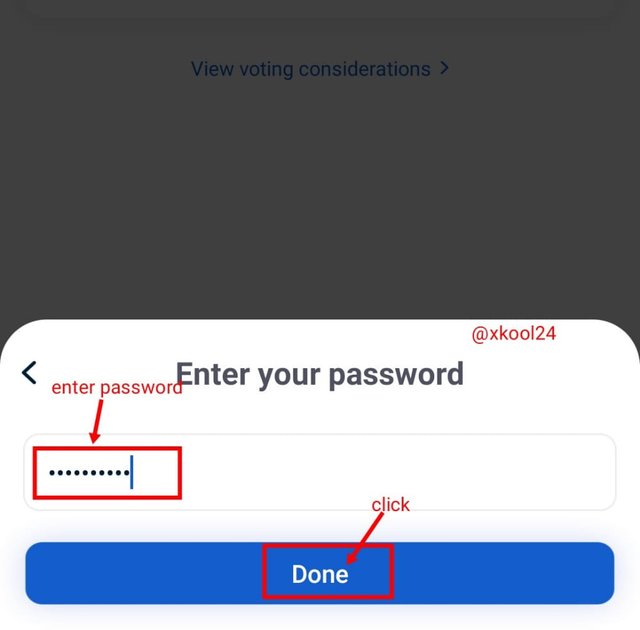
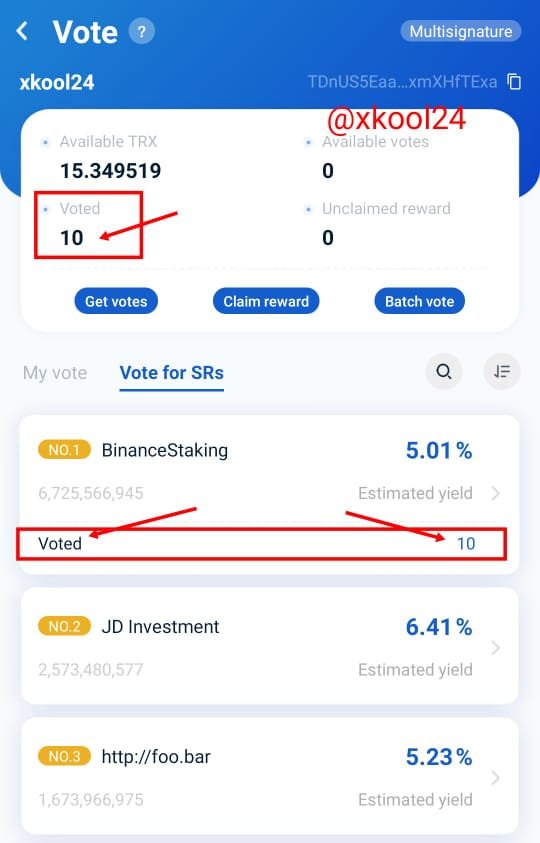

Conclusions

The TRON Blockchain which runs on the DPoS is exemplary in its operation when scalability and transaction throughput are checked relative to another consensus mechanism (PoW and PoS) which are not a match. It brings the truly democratic and decentralized feature into play in its modus operandi where witnesses or Delegates are elected/voted for before they can validate a given block.
Also, a typical scenario is in its Super Representative where individuals are elected/voted for in each round before they can be observed to be on the top 27 who are responsible for maintaining the Tron Network.
Thank you Professor @yohan2on for this lesson.
All screenshots are taken from the Tronlink wallet App.

Hi @xkool24
Thanks for participating in the Steemit Crypto Academy
Feedback
Total| 9/10
This is good work. All questions have been well explained in a clear and detailed way. Thanks for taking the time to research as you create content on the Governance of the Tron Ecosystem.
Thanks, Prof @yohan2on for the Review.
If #club5050 was added as a criterion in your guideline and wasn't followed through that would be justifiable. Why not update that so others don't make similar oversight mistakes
Thanks always.
Hello Prof, Please why score me 0/1 for #club5050? Kindly crosscheck.
In the last 7 days you have cashed out much more than you have powered up so you do not qualify for #club5050.